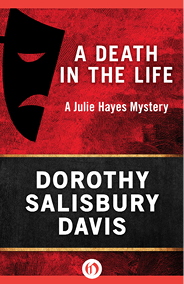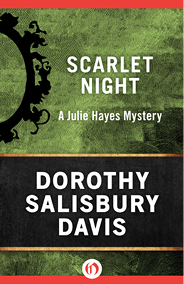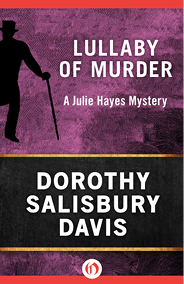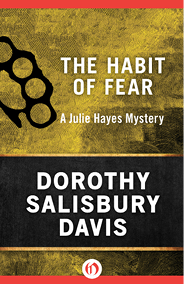Lullaby of Murder (28 page)
Authors: Dorothy Salisbury Davis

The tardy watchman found her that way.
J
ULIE HAD RIDDEN ONCE
before in a car with the sirens screaming—when she’d been taken to the morgue by the police to identify a murder victim. It drifted through her mind that if she needed identification, they would call Jeff. No.
She must have said the word aloud, for someone reassured her. “It’s going to be all right. You’re safe now.” She opened her eyes and a young medic riding on the jump seat winked at her solicitously. “They’ll get the bastards.”
How, she wondered, did he know there was more than one?
There were many things she wondered as she drifted in and out of sleep in the hours and days that followed. She wondered at the meanings of the various medical attentions. A stubborn infection set in from the several knife wounds. The doctors were having trouble keeping her temperature down. They’d taken to calling her Sebastian. “How’s my little Sebastian this morning?” Neither males nor saints appealed to her. She kept silent. She wondered how Dr. Callahan came to be sitting at her bedside one day when she opened her eyes. How many appointments had she had to cancel to be there? She wondered how Jeff felt, how he really felt, trying to hold her hand. She took it away and hid it beneath the sheet. How had they first come to know? Was it the newspapers? On television …
Gossip columnist raped. … Wife of noted newspaper
c
olumnist. …
She didn’t want to speak to anyone and didn’t. Except to the police, who came regularly to prod her for just a little more information. And any help she could give in identifying her attackers could save other women from her experience. She tried to care, to sort out why it had happened to her. Any woman would have done them, the female of any species. And there came the moment when the police therapist tried to get through to her by assuring her that her husband, an intelligent, understanding man, would not reject her because of what had happened. Julie looked at the woman, grimly amused.
“You’d be surprised,” the therapist said, oozing kindness.
So would you, Julie thought, but she said nothing.
She wasn’t even curious about all the flowers, from whom or from where they’d come. She did like one arrangement that arrived without any card at all, tiny golden roses. “They don’t even look real,” the nurse said.
Nothing much did.
When the infection healed and it was time for her to leave the hospital, she became the very model of cooperation. She intended to prove her competence; under no circumstances did she intend to return to Sixteenth Street. A friend from the Actors’ Forum came and camped with her for a few days at Forty-fourth Street. The greatest healer was making living quarters out of the shop. The waves of revulsion came more rarely. She could generally turn them aside before they swamped her. Which was not so with the almost constant rage over the Jeff situation. She was sick of her own anger, but she could not escape it. She needed help. It was funny how much better she felt just admitting it. Dr. Callahan gave up a lunch hour to see her right away.
I
T DID NOT SEEM
like old times. Not at all. Except for the long silence between them before she was finally able to say, “Jeff wants a divorce.”
“Let’s talk about it,” the doctor said, which was more than she had used to say, even to get things going. Jeff had said she would be supportive, and as usual, he was right.
Julie declined the couch. That way she was able to talk. “I don’t mean he wants it because of what happened to me. I’m not laying that on him. But I keep thinking that’s why it happened. I went crazy when he said it, wild, you know—out of control. The very things I didn’t want to say I kept saying over and over. The only way I could stop was by getting out of the house.”
“What did you say that you didn’t want to say?”
“Things like ‘What’s going to happen to me?’ Or, ‘What am I going to do?’”
“Why was that such a terrible thing to say?”
“I wanted it to be me who asked for the divorce.”
“Oh,” the doctor said, drawing the sound out almost mockingly. Was it the truth? Julie wondered. It felt like it. “So why didn’t you do it?”
“I couldn’t. I was afraid to. I’m not sure what I’m saying is true, doctor. I can’t remember thinking seriously of divorce until Jeff brought it out in the open. I feel I did, but that’s not knowing. I’m not making sense, am I?”
“Go on.”
“I panicked but I didn’t want him to know it. I didn’t want him to see how shaky I was, but I couldn’t help myself. And that made me angry.”
“With yourself?”
“Who else?”
“And you were afraid. Is that what you mean by panicked?”
Julie nodded. “All of a sudden I was nobody again. There was nothing of
me
in that living room. I remember looking for a china giraffe I’d bought in a Paris flea market, the one thing of mine, but when I found it, I put it right back on the shelf.”
The doctor sat, her forefinger touching her lower lip, her dark eyes blinking as she stared at Julie while Julie recounted the length and depth of the reliance on Jeff. Then, winding up: “But I’m not going back. Even if … I’m not.”
“All of a sudden you were nobody again.” The therapist picked up on something she had said sometime before.
“Growing up with my mother’s name. I never even knew my father, except for his picture on the mantel. I’ve said this to you so many times.”
“Go on.”
“I think she made up all the stories about him, an Irish diplomat who up and disappeared after he got the marriage annulled. I guess he was a Catholic. And you know what that makes me as far as the church is concerned. Oh, to hell with him. To hell with him! I’ve been saying it all my life.”
“Tut, tut, tut,” the doctor chided. “You are
guessing.
You
think
she made up the stories. What do you
know
?”
Julie was given pause. What did she know? As a child she had asked questions, and as a child she had liked what her mother told her, and she had believed every word, even the ones she knew were contradictory. As to the question still foremost in her mind, why the annulment? It was one question her mother answered consistently right up to the end of her life.
“Because it was what he wanted.”
Her mother was great at giving men what they wanted. Julie looked at her watch.
The doctor repeated the question in that voice Julie recognized from old whenever she’d been trying to escape the couch: “What do you know?”
“I don’t
know
anything.”
“Not anything? No marriage license? No record of annulment? No friends of your mother’s to talk to, no best man, no maid of honor at their wedding? No wedding photographs? Nothing about him on your birth certificate?”
“That was almost thirty years ago, doctor. It’s a long time.”
“Thank you for telling me. You amaze me: you are curious about every urchin on the street. You play detective. You dig up secret lives of celebrities and do not even know your father’s name.”
“I do know that,” Julie said softly.
“So?”
“Thomas Francis Mooney. And I know he was born in Ireland. It’s on my birth certificate.”
“And your name on the birth certificate?”
“Julie Anne Richards.”
“Your mother’s maiden name, yes?”
“With a notation about my father—whereabouts unknown.”
“Very curious.” It was one of Dr. Callahan’s rare comments. She adjusted her analyst’s chair to relieve a back strain. “How do you feel about the men who attacked you?”
“I loathe them. It makes me sick to think about them.”
“
Do
you think about them?”
“I can almost turn it off now, but in a way that’s bad. I ought to be trying to remember things about them if I’m going to be any help to the police.”
“Do you feel ashamed? Guilty?”
“I don’t know about ashamed exactly. I feel dirty. As though a thousand enemas wouldn’t clean me out. But guilty, no. Not this trip.”
The doctor nodded understanding. “A thousand enemas will help. And getting on with your life. That is the important thing. You are not going back, so you are going forward, yes? Do you want to talk about the impending divorce?”
“I don’t know what there is to talk about. The sooner the better. Did you think it would happen? I mean back when I was in therapy with you?”
The doctor almost smiled. “I am not always right,” she said. “Do you wish to resume therapy?”
“No. For one thing, I can’t afford it.”
“Do you still have the job on the newspaper?”
“Yes.”
“And there will be a divorce settlement, no? You were not married yesterday. How many years?”
“Nine. I will not take any more money from Jeff.”
The therapist breathed deeply, as though she needed patience. “So you have come full circle. Independence.”
Sarcasm? Julie wasn’t sure. “I hope so, doctor. Maybe that way I’ll get rid of the anger. I wish I understood it. It’s like an obsession.”
“Is it possible that you need it at the moment?”
Julie thought about that. She was surprised. “Possibly,” she admitted.
The doctor released the brake on her chair. “Total independence is as neurotic as total dependence. Fortunately, either condition is beyond most of us. You know I am here in an emergency.”
Julie thanked her.
No good-bye, no handshake, no convoy to the door: it made for a continuity of sorts, something unfinished, something that might never be finished.
Dorothy Salisbury Davis is a Grand Master of the Mystery Writers of America, and a recipient of lifetime achievement awards from Bouchercon and Malice Domestic. The author of seventeen crime novels, including the Mrs. Norris Series and the Julie Hayes Series; three historical novels; and numerous short stories; she has served as president of the Mystery Writers of America and is a founder of Sisters in Crime.
Born in Chicago in 1916, she grew up on farms in Wisconsin and Illinois and graduated from college into the Great Depression. She found employment as a magic-show promoter, which took her to small towns all over the country, and subsequently worked on the WPA Writers Project in advertising and industrial relations. During World War II, she directed the benefits program of a major meatpacking company for its more than eighty thousand employees in military service. She was married for forty-seven years to the late Harry Davis, an actor, with whom she traveled abroad extensively. She currently lives in Palisades, New York.
All rights reserved, including without limitation the right to reproduce this ebook or any portion thereof in any form or by any means, whether electronic or mechanical, now known or hereinafter invented, without the express written permission of the publisher.
This is a work of fiction. Names, characters, places, events, and incidents either are the product of the author’s imagination or are used fictitiously. Any resemblance to actual persons, living or dead, businesses, companies, events, or locales is entirely coincidental.
Copyright © 1984 by Dorothy Salisbury Davis
Cover design by Tracey Dunham
978-1-4804-6045-4
This edition published in 2014 by Open Road Integrated Media, Inc.
345 Hudson Street
New York, NY 10014






